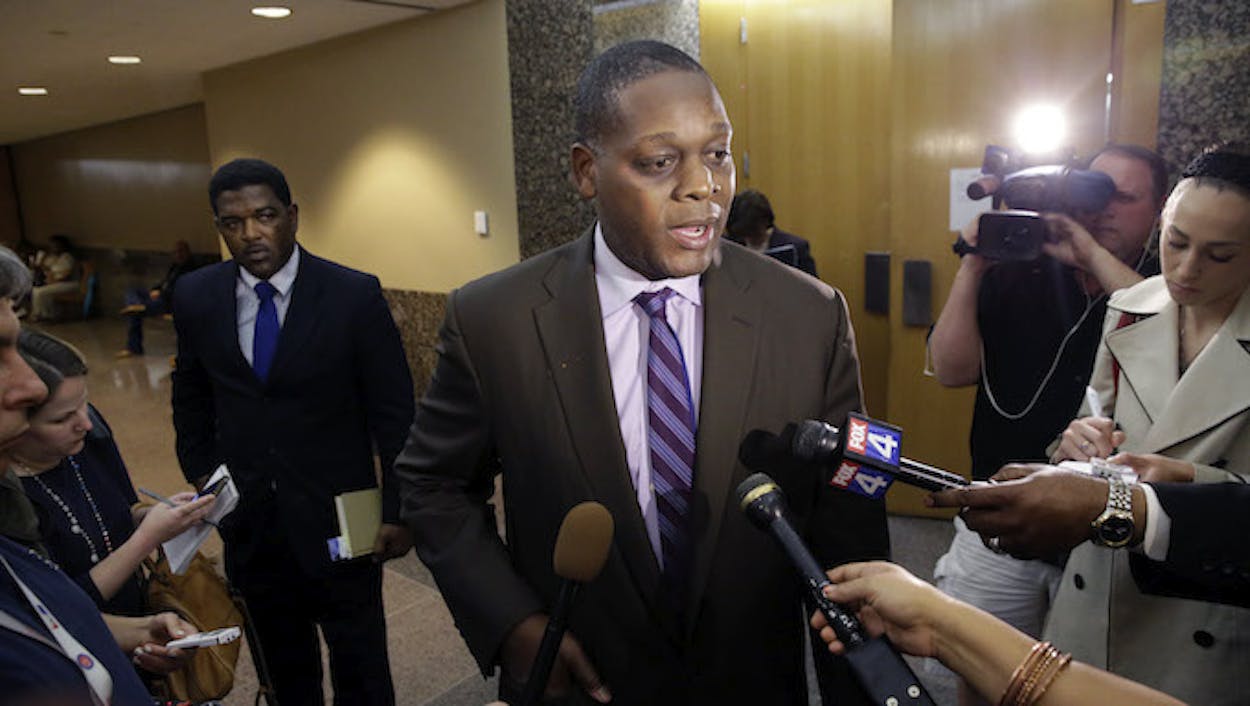 Twenty-year-old Sir Young pled guilty to the 2011 rape of a 14-year-old girl, but a lot of what happened in his case was strange: especially his sentence. In April, State District Judge Jeanine Howard opted to put Young on probation, ordering him to perform 250 hours of community service at a rape crisis center and to spend 45 days in jail, but exempted him from some of the probation conditions that sex offenders typically face.
Twenty-year-old Sir Young pled guilty to the 2011 rape of a 14-year-old girl, but a lot of what happened in his case was strange: especially his sentence. In April, State District Judge Jeanine Howard opted to put Young on probation, ordering him to perform 250 hours of community service at a rape crisis center and to spend 45 days in jail, but exempted him from some of the probation conditions that sex offenders typically face.
I’ve argued in this space in the past that I’d prefer to see both jail as a sentence and sex offender registration utilized cautiously, but it also seems as though caution should be used when ordering a convicted rapist to spend 250 hours in a facility intended to make rape survivors feel safe. But it became clear after Howard spoke to the media that her idea of who the real victim was in the incident between Young and the young teenager he was convicted of raping wasn’t necessarily the girl. As the Dallas Morning News reports:
Howard said she made her decision for several reasons, including: The girl had texted Young asking him to spend time with her; the girl had agreed to have sex with him but just didn’t want to at school; medical records show the girl had three sexual partners and had given birth to a baby; and Young was barely 18 at the time.
“She wasn’t the victim she claimed to be,” Howard said. “He is not your typical sex offender.”
At best, Howard, who recused herself from further involvement in the case so she could speak to the media, seems to suggest that an 18-year-old who pursues sex with a 14-year-old girl is committing a lesser crime if the young teenager, who is legally unable to consent to the act, texts him in advance; at worst, they imply that, because the girl may have had sex in the past, she can’t be the victim of rape.Those implications have troubled many: Dallas District Attorney Craig Watkins expressed his concerns about the case after Howard made her statements, saying that “The judge basically blamed the victim for what happened to her,” and that it “calls into question their credibility,” making it less likely for victims to speak out. For her part, the girl in question—who is now 17—told the Morning News that “it would have been better for me not to say anything.” The case has generated national media attention, and this week thousands signed a petition on the website Change.org calling on Howard to resign from the bench.
The details of the case are disappointing; the judge’s statements do place information that is irrelevant to Young’s case, such as whether the girl in question was a virgin, in a context that makes it hard to trust her assessment of the situation. People who’ve had sex in the past, obviously, can still be raped, and that’s true no matter the age of the victim. The implication that because this girl had had sex with others meant that she was likely to have consented to sex with Young—despite their age difference making that a legal impossibility—could have a chilling effect on others when deciding whether to come forward.
While it’s possible that jail time wasn’t the right punishment for Young, it’s unlikely that 250 hours of working in a rape crisis facility is, either, if only because the Dallas Area Rape Crisis Center asked that he not perform his service there. Similarly, lifelong sex offender registration, which can do harm to people long after their debt to society is supposed to have been paid, might well be an unfortunate outcome. In many cases, particularly those involving young people, extended probation sentences make a good deal of sense.
All of that might potentially be the case for Young, as well—but it’s also difficult to trust Howard’s judgment on that matter, because her statements indicated far less about why she believed Young was a strong candidate for reform after a long period of community supervision, and far more about why she believed that his victim was not someone whose allegations deserved to be treated seriously.
It’s possible to both seek a restorative approach to criminal justice that doesn’t look to long jail sentences as the first or only option, and to want to ensure that every rape case is a situation in which the accused—and not the victim—stands trial. And statements like the ones from Howard make it more difficult to get there.
After Howard’s recusal, another judge at a May 8 hearing altered Young’s probation terms—though not his sentence. As the Associated Press reports:
State District Judge Carter Thompson imposed all of the standard terms of probation, including stipulations that Young may not have any contact with children, must be evaluated for sex offender treatment and must stay away from pornography.
While the victim’s family is still considering filing a complaint against Judge Howard with the state, her mother told reporters that she felt that “justice had been done” as a result of that ruling.
Justice, in these cases, is always hard to come by—but it’s especially rare in a case when the judge seems to be blaming the victim.
(AP Photo/LM Otero)








